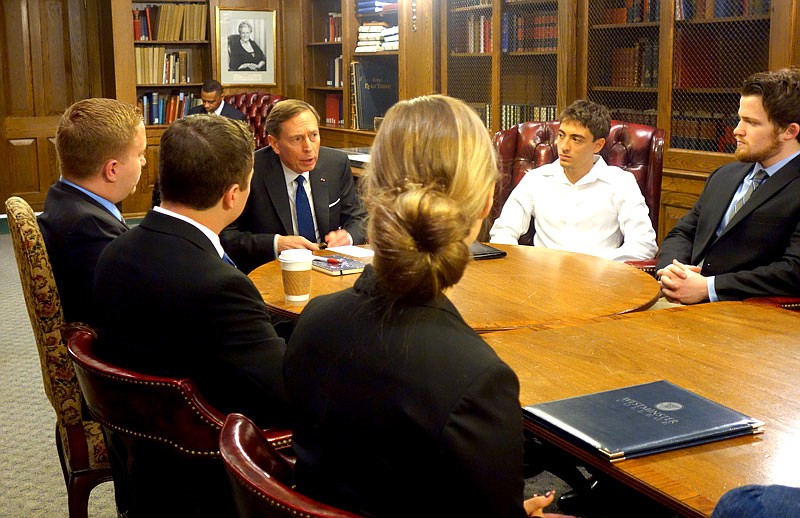According to retired Gen. David Petraeus, Mark Twain's truism holds today: "History doesn't repeat itself, but it rhymes."
Petraeus visited Westminster College Saturday to participate in Churchill Fellows Weekend, a celebration of Winston Churchill's legacy, and to share his insights.
"It's really great to be back here at this wonderful monument to one of history's true great leaders," Petraeus said.
Petraeus first visited Westminster back when he was in uniform.
"I remember the visit with great fondness," he said. "I found enormous intellectual stimulation, energy, inspiration and so forth here."
As director of the CIA from 2011-12 and former commander of U.S. and NATO forces in Afghanistan, Petraeus shared some of his expertise on current events (edited for length).
Q. The situation in the Middle East is a highly complicated one, and the U.S. is highly entangled in it. What do you see as the U.S.'s route out of the Middle East?
A. It's important to note we're engaged in the Middle East, and a number of other areas in our fight as a coalition against Islamic extremists is one that is going to be generational in duration. This is not the fight of a decade, much less a few years. It's one we want to do as a coalition.
Churchill was right when he said, "The only thing worse than fighting with allies is fighting without them."
I strongly support that as the commander of the largest military coalition in history, being the one in Afghanistan. It's particularly important that we have Muslim partners in this fight, and we do. One of the achievements of the previous administration, now continued by this administration, is to ensure the Islamic countries stay engaged in a battle which for them is existential in nature.
This is more of a class within the Muslim world, within the civilization, than it is between civilizations, as significant as the threats posed by Muslim extremists are.
It's going to take a sustained commitment, and I think it also has to be sustainable. We've been able to help our Iraqi partners to reconstitute after the defeat in certain parts of Iraq by the Islamic State, to retrain and re-equip, and enable them by the provision of our drones and precision strike assets, to gradually roll back the Islamic State.
Q. (Former British Prime Minister) Margaret Thatcher spoke at the National Churchill Museum 21 years ago, and much of what she said applies today. She spoke about the growing Russian threat and the fact they might portray themselves as a friend when they're really a foe.
A. Russia certainly is not an ally. It's correct to observe there are places where our objectives may converge - Russia wants to see the defeat of Islamic extremists, just as we do. But there are also more cases where those objectives tend to conflict.
It's interesting, in light of this weekend's focus on Churchill and the Iron Curtain speech made here, to hear President (Vladimir) Putin's spokesman yesterday talking about how this is a new Cold War. In fact, it's perhaps a bit colder than it was at the depth of the Cold War, which seems to be a bit of rhetorical excess to me.
This is a challenging relationship, but that doesn't mean we shouldn't have strategic dialogue with Russia, as we did when we had tens of thousands of nuclear warheads pointed at each other. As we engage with Russia, there's no question we should do it with eyes wide open, in a very coldly realistic way with no illusions that Russia shares our values.
Q. On a completely different note, what do you like about Fulton?
A. I love Fulton. I've been here before, and as a student of Churchill, I think this museum is a tremendous and fitting tribute to the individual William Manchester described as the "last lion."
I've devoured the biographies of Churchill over the years and read many of the books that he wrote, including "Malakand Field Force," which is about his time as a field officer in the tribal areas of Pakistan. I reread it when I was on my way to Afghanistan, and it's still relevant. He's truly extraordinary in every possible way.
It's a privilege to be back here, and it's stimulating to do it. This is a wonderful place, and I hope that all of you who are around it don't just take it for granted and realize just how special it is.

